

10 slang phrases that perfectly sum up their era. 18 May 2014Last updated at 19:49 ET Lexicographer Jonathon Green selects the slang words and expressions that encapsulate the age in which they were coined.

I've been collecting slang and and publishing books about it for 30 years. My database contains 125,000 words and phrases and they keep coming. One thing I've learnt - the more slang changes, to half-inch the well-known phrase, the more slang stays the same. Politically correct, even polite: I fear not. As examples I offer a selection of terms that display some of slang's nuts and bolts. 10 slang phrases that perfectly sum up their era. The triumph of English: A world empire by other means. EastEnders turning Glaswegians Cockney says TV study. 9 September 2013Last updated at 19:08 ET Researchers looking at how television viewing can lead to accent changes have claimed Glaswegian fans of EastEnders are picking up Cockney dialect.
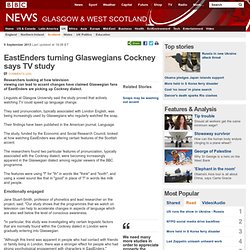
Linguists at Glasgow University said the study proved that actively watching TV could speed up language change. They said pronunciation, typically associated with London English, was being increasingly used by Glaswegians who regularly watched the soap. Their findings have been published in the American journal, Language. Are local dialects dying out? If you don't know what it means to put up your "gingham" when it's "mizzling" - then help is at hand.
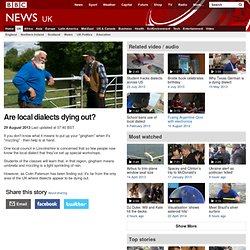
How the internet is killing off silent letters. Professor David Crystal says people drop letters when typing them into search engines He says the internet will influence changes in spelling in the future Academic labels the 'h' in rhubarb as 'illogical' By Daily Mail Reporter Published: 08:29 GMT, 2 June 2013 | Updated: 06:40 GMT, 3 June 2013 David Crystal, professor of linguistics of Bangor University, explained how people are dropping letters when typing words into search engines.
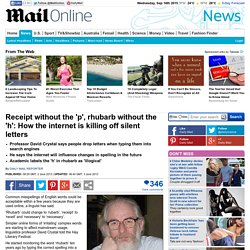
How Texting Is Changing Your Grammar. The Current State Of Technology In K-12 5.33K Views 0 Likes What is the next device most students will soon purchase? How many schools have a digital strategy? Learn English online: How the internet is changing language. Online, English has become a common language for users from around the world.

In the process, the language itself is changing. When America emerged from the ashes of a bruising war with Britain in 1814, the nation was far from united. Noah Webster thought that a common language would bring people together and help create a new identity that would make the country truly independent of the British. Webster's dictionary, now in its 11th edition, adopted the Americanised spellings familiar today - er instead of re in theatre, dropping the u from colour, and losing the double l from words such as traveller.
It also documented new words that were uniquely American such as skunk, opossum, hickory, squash and chowder. An American Dictionary of the English Language took 18 years to complete and Webster learned 26 other languages in order to research the etymology of its 70,000 entries. New York, a graveyard for languages. 15 December 2012Last updated at 19:13 ET By Dr Mark Turin Linguist and broadcaster Home to around 800 different languages, New York is a delight for linguists, but also provides a rich hunting ground for those trying to document languages threatened with extinction.
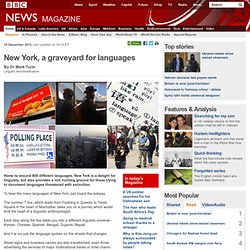
Why Languages Change. Why do languages change?
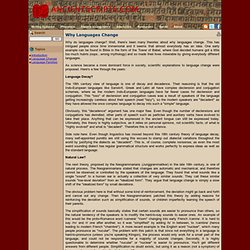
Well, there's been many theories about why languages change. This has intrigued people since time immemorial and it seems that almost everybody has an idea. One early example can be found in Bible in the form of the Tower of Babel, where God decided humans got a little too much hubris (oops...wrong mythology) and so made their lives miserable by giving everybody different languages. As science became a more dominant force in society, scientific explanations to language change were proposed. External Change. Processes of Change. Use It or Lose It: Why Language Changes over Time. The words used the most in everyday language are the ones evolving at the slowest rate, say two new studies published in Nature.
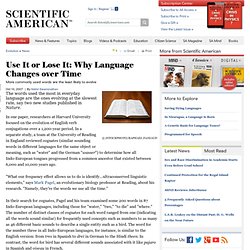
In one paper, researchers at Harvard University focused on the evolution of English verb conjugations over a 1,200-year period. In a separate study, a team at the University of Reading in England reviewed cognates (similar sounding words in different languages for the same object or meaning, such as "water" and the German "wasser") to determine how all Indo-European tongues progressed from a common ancestor that existed between 6,000 and 10,000 years ago.
"What our frequency effect allows us to do is identify…ultraconserved linguistic elements," says Mark Pagel, an evolutionary biology professor at Reading, about his research. Dialect levelling in Britain. Dialect levelling is the means by which dialect differences decrease.
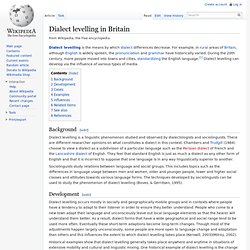
For example, in rural areas of Britain, although English is widely spoken, the pronunciation and grammar have historically varied. During the 20th century, more people moved into towns and cities, standardizing the English language.[1] Dialect levelling can develop via the influence of various types of media. Background[edit] Dialect levelling is a linguistic phenomenon studied and observed by dialectologists and sociolinguists.
There are different researcher opinions on what constitutes a dialect in this context. Sociolinguists study relations between language and social groups. The nature of language change.